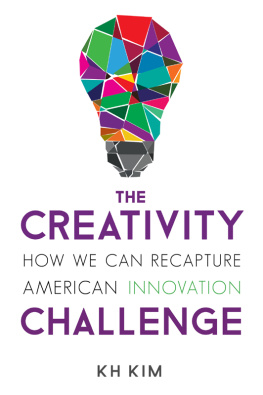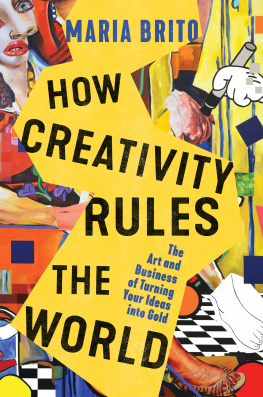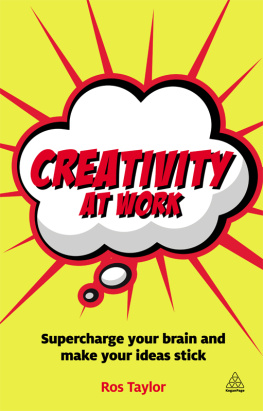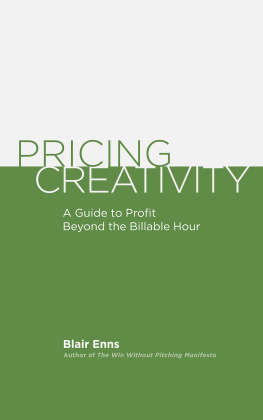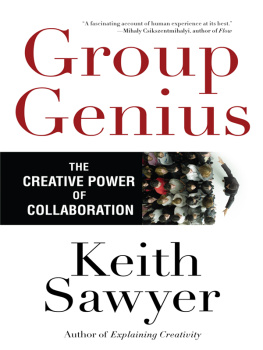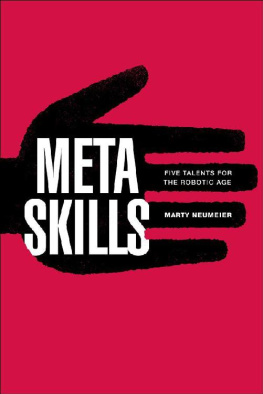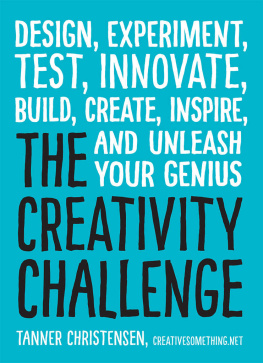THE 46 RULES OF GENIUS
An Innovators Guide to Creativity
Text and illustrations by Marty Neumeier
New Riders
Find us on the web at www.newriders.com
To report errors, please send a note to
New Riders is an imprint of Peachpit, a division of Pearson Education
Copyright 2014 by Marty Neumeier
Acquisitions Editor
Nikki Echler Mcdonald
Proofreader
Liz Welch
Production Editor
David Van Ness
Design Director
Marty Neumeier
Designers
Brooke Klass
Cya Nelson
Irene Hoffman
Beryl Wang
Author Photo
courtesy of Content Magazine
Notice of Rights
All rights reserved. No part of this book may be reproduced or transmitted in any form by any means, electronic, mechanical, photocopying, recording, or otherwise, without the prior written permission of the publisher. For information on getting permission for reprints and excerpts, contact .
Notice of Liability
The information in this book is distributed on an as is basis without warranty. While every precaution has been taken in the preparation of the book, neither the author nor Peachpit shall have any liability to any person or entity with respect to any loss or damage caused or alleged to be caused directly or indirectly by the instructions contained in this book or by the computer software and hardware products described in it.
Trademarks
Many of the designations used by manufacturers and sellers to distinguish their products are claimed as trademarks. Where those designations appear in this book, and Peachpit was aware of a trademark claim, the designations appear as requested by the owner of the trademark. All other product names and services identified throughout this book are used in editorial fashion only and for the benefit of such companies with no intention of infringement of the trademark. No such use, or the use of any trade name, is intended to convey endorsement or other affiliation with this book.
ISBN 13: 978-0-133-90006-4
ISBN 10: 0-133-90006-1
9 8 7 6 5 4 3 2 1
Printed and bound in the United States of America
Text and
illustrations
by
Marty Neumeier
In honor of
Saul Steinberg
and
E. B. White
WHAT IS A GENIUS?
To most people, a genius is someone with a towering IQsay 140 points or higher. This is simplistic. A genius is more than that, but also less. In practice it only takes an IQ of 125 to become a genius. What you need beyond that is a facile imagination and the skills to apply it, driven by a passionate will toward a focused goal.
A genius doesnt start out as a genius at every-thing but a genius at something. For example, you can be a genius at molecular biology, or a genius at reading peoples feelings. You can be a genius at programming software, or a genius at broken-field running. This puts genius-hood within the reach of nearly everybody. Over time, a genius may connect several somethings into a semblance of everything, but this is optional in the definition of genius.
In my recent book Metaskills, I laid out five talents well need to thrive in an age of increasing man-machine collaboration. These talents, which Ive called metaskills, are feeling, or empathy and intuition; seeing, or systems thinking; dreaming, or applied imagination; making, or design talent; and learning, the ability to acquire new skills. None of these needs a high IQ. What they need is a high regard for creativity. The rules in this book are creative rules. Theyre general guidelines to help you envision, invent, contribute, and grow.
Then whats a genius? Heres my working definition: A genius is any person who turns insight into innovation, and in the process changes our view of the world. In other words, its someone who takes creativity to the point of originality. The philosopher Arthur Schopenhauer said it best: Talent hits a target no one else can hit; genius hits a target no one else can see.
The rules in this book are as timeless as they can be. None of them are new, yet they can help you create something new. Michelangelo didnt invent the hammer and chisel, but by using these tools he sculpted the Piet. Just as you cant shape a block of marble with your bare hands, you cant shape ideas with your bare mind. You need rules. Rules are the tools of genius. Use them when they help; put them aside when they dont.
Ive purposely written a concise book. Most of the creative people I know are consumed by their projects, and reading a long book is a luxury they cant always afford. So heres a slim volume with bite-size advice. You can reach into it randomly, underline its salient points, return to the rules as needed.
I make no claims of completeness for The 46 Rules of Genius. Instead, Ive chosen to focus on the principles most often ignored, forgotten, or heedlessly broken. It starts with some advice on strategyor how to get the right idea. It continues with practical tips on executionhow to get the idea right. From there it moves to building your creative skills over time, and finally to putting your brilliance to work in the larger world.
Caution: The 46 Rules of Genius is not for everyone, for the simple reason that not everyone can be a genius. This is not usually a failing of native intelligence. Its more likely a lack of a) will, or b) skill. I presume you have a good supply of a), or you wouldnt have this book in your hand. As to b), youll need a little helpand a healthy appetite for work. Happily, work is not really work when youre investing in what you love.
My fondest wish is that youll combine the desire you already have with these time-tested principles to ignite an endless cycle of creative growth: your desire will drive your learning, and your learning will fuel your desire. This is the magic that makes a genius. If you accept this as a central premise, the rest will follow.
Marty Neumeier
CONTENTS
Part 1
HOW CAN I INNOVATE?
There is
no great genius
without a mixture
of madness.
Aristotle
Rule 1
BREAK THE RULES
Youve probably heard that its unwise to break the rules until you know how to use them. Youve probably also heard the oppositethere are no rulesits the job of innovators to disregard convention. Which of these is true?
Oddly, both. This is the Genius Paradox. You have to disobey the rules of creativity to obey the rules of creativity. And in obeying the rules of creativity, you automatically disobey the rules of creativity. Thats because the number one rule is to break the rules.
Creative rules are not rigid dictates but rough principlespatterns that a variety of artists, scientists, and thinkers have used for centuries as the scaffolding for their inventions. You shouldnt be a slave to them. You dont need to keep them in your conscious mind. But having considered them will broaden your repertoire for any creative challenge that calls for a full response.
Heres how to resolve the Genius Paradox:
1) React to the rules by embracing them or breaking them.
2) Observe the results.
3) Rewrite the rules from your own experience.



